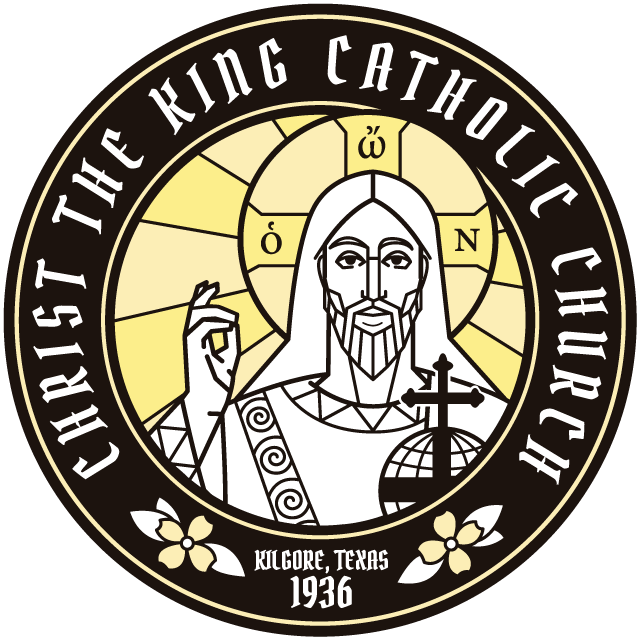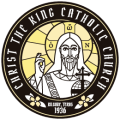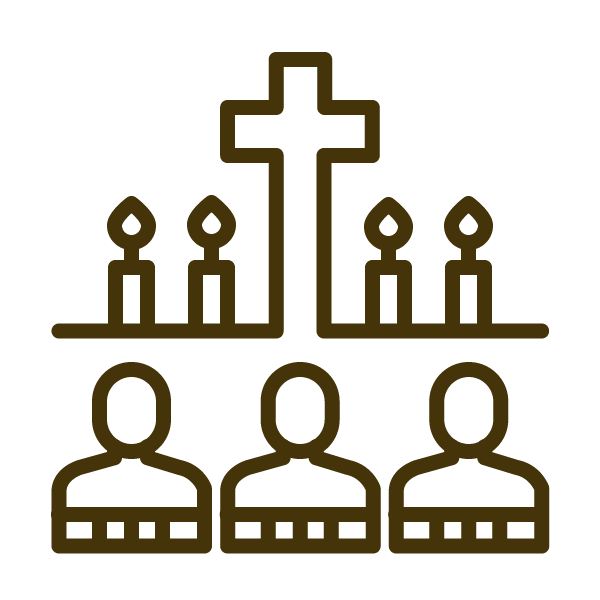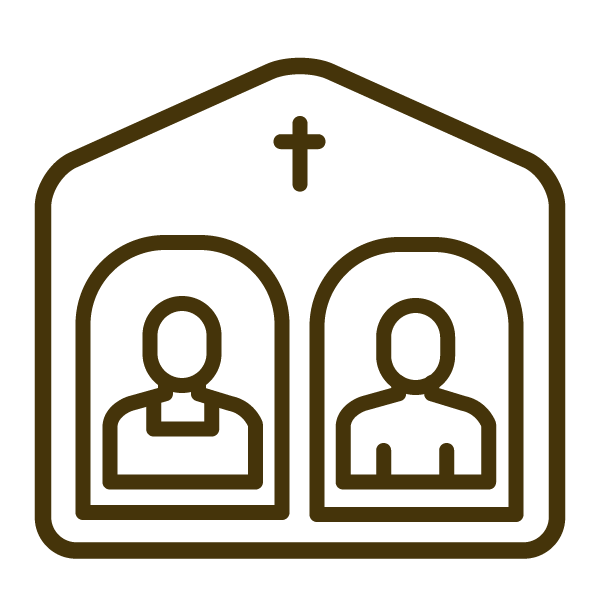FUNERALS
“The Church who, as Mother, has borne the Christian sacramentally in her womb during his earthly pilgrimage, accompanies him at his journey’s end, in order to surrender him “into the Father’s hands.” She offers to the Father, in Christ, the child of his grace, and she commits to the earth, in hope, the seed of the body that will rise in glory. This offering is fully celebrated in the Eucharistic sacrifice; the blessings before and after Mass are sacramentals.”
The Three Parts of a Catholic Funeral
(1) Vigil Service (Wake)
At the vigil, the Christian community keeps watch with the family in prayer to the God of mercy and finds strength in Christ’s presence” (OCF 56). The vigil service usually takes place during the period of visitation and viewing at the funeral home. It is a time to remember the life of the deceased and to commend him/her to God. In prayer, we ask God to console us in our grief and give us strength to support one another.
The vigil service can take the form of a Service of the Word with readings from Sacred Scripture accompanied by reflection and prayers. It can also take the form of the Office for the Dead from the Liturgy of the Hours. It is customary in some places to pray the rosary at the wake; it may certainly be added to the proper vigil service. The clergy and your funeral director can assist in planning such service.
It is most appropriate, when family and friends are gathered together for visitation, to offer time for recalling the life of the deceased. For this reason, eulogies are usually encouraged to be done at the funeral home during visitation or at the vigil service.
(2) Funeral Liturgy
The funeral liturgy is the central liturgical celebration of the Christian community for the deceased. When one of its members dies, the Church encourages the celebration of the funeral liturgy at a Mass. When Mass cannot be celebrated, a funeral liturgy outside Mass can be celebrated at the church or in the funeral home.
At the funeral liturgy, the Church gathers with the family and friends of the deceased to give praise and thanks to God for Christ’s victory over sin and death, to commend the deceased to God’s tender mercy and compassion, and to seek strength in the proclamation of the Paschal Mystery. The funeral liturgy. therefore, is an act of worship, and not merely an expression of grief.
(3) Rite of Committal (Burial or Interment)
The Rite of Committal, the conclusion of the funeral rite, is the final act of the community of faith in caring for the body of its deceased member. It should normally be celebrated at the place of committal, that is, beside the open grave or place of interment. In committing the body to its resting place, the community expresses the hope that, with all those who have gone before us marked with the sign of faith, the deceased awaits the glory of the resurrection.
The Rite of Committal is an expression of the communion that exists between the Church on earth and the Church in heaven, that the deceased passes with the farewell prayers community of believers into the welcoming company of those who need faith no longer, but see God face-to-face.
Burial of the body or cremated remains should be in a sacred place; the Church prefers but does not mandate a Catholic cemetery. The body or the cremated remains may be interred either in a grave, or entombed in a mausoleum or columbarium. The practice of scattering cremated remains (ashes) on the sea, in the air, or on the ground is not permitted for a Catholic. Keeping cremated remains at home “is not the reverent disposition that the Church requires” (OCF 416).
Cremation
“The Church earnestly recommends that the pious custom of burying the bodies of the deceased be observed, nevertheless, the Church does not prohibit cremation unless it was chosen for reasons contrary to Christian doctrine” (Canon 1176 #3).
While the Church continues to hold a preference for corporeal burial, cremation has become part of Catholic practice in the United States and around the world.
The Church’s reverence and care for the body grows out of a reverence and concern for the person whom the Church now commends to the care of God. This is the body once washed in baptism, anointed with the oil of salvation, and fed with the bread of life. This is the body whose hands clothed the poor and embraced the sorrowing. The human body is so inextricably associated with the human person that it is hard to think of a human person apart from his or her body.
When cremation is chosen, the Church prefers that the body be cremated after the funeral liturgy so that the body be present for the funeral rites: “Although cremation is now permitted by the Church, it does not enjoy the same value as burial of the body. The Church clearly prefers and urges that the body of the deceased be present for the funeral rites, since the presence of the human body better expresses the values which the Church affirms in those rites” (OCF 413). When circumstances require it, however, cremation may take place before the funeral rites.
Frequently asked questions
Any baptized Catholic can and should be buried from the Church, including both those who have been most faithful in their practice of the faith and those who have been less faithful or separated from the Church, through illness, distance or special circumstances. Absence from the parish due to such circumstances does not separate them from the community of the Church and a Funeral Liturgy. Non-Catholic members of a parishioner’s family may be buried from the Church unless it was contrary to their wishes during their life. Catechumens who are in the process of the Rite of Christian Initiation are also to be buried from the Church. Children are honored with Christian burial if the parents intended for the child to be baptized but the child died prior to baptism.
Funeral directors specialize in serving the needs of families at the time of death and will also assist in the notification of the pertinent people or agencies. The local parish may be called directly by the family or the funeral director may be asked to make the contact. After the parish is notified and has confirmed the day and time of the funeral, the family will most likely be asked to come to the parish office in order to provide further information regarding the deceased and to plan the funeral rites. It also gives the parish the opportunity to offer their sympathy through their bereavement ministry.
There are at least 55 various readings of Scriptures that the Church has specifically chosen for funerals. When you meet with your parish contact to plan the funeral rites, the readings will be shared with you at that time. Non-Scripture readings are not permitted.
Non-Catholics are not allowed to read the scripture readings at Mass but may do so at the other rites in the Order of Christian Funerals (OCF). All readers must be well prepared for the proclamation and believe in what they are proclaiming, engaging the gathered assembly through their eye contact, tone, rhythm and pace of the reading.
“Music is integral to the funeral rites. It allows the community to express convictions and feelings that word alone may fail to convey. It has the power to console and uplift the mourners and to strengthen the unity of the assembly in faith and love. The texts of the songs chosen for a particular celebration should express the paschal mystery of the Lord’s suffering, death, and triumph over death and should be related to the readings from Scripture.” (OCF 30). Secular music/non-liturgical songs are not to be used in the funeral liturgy.
A eulogy, by which is meant an prolonged narration of human achievements, is not part of the funeral Mass. Family or friends may be invited to share such testimony at the vigil or at the memorial luncheon or reception that often follows the funeral vigil. The OCF does allow for a family member or friend to “speak in remembrance of the deceased before the final commendation begins” (OCF 170). Rather than a eulogy, this remembrance should be a well-prepared and brief reflection on the life of the deceased in the context of his or her life of faith.
Individuals are certainly encouraged to plan their funeral, just as they make arrangements for a will and for the financial means to pay for their funeral. This relieves some pressure from the family during the emotional grieving process immediately after the death of a loved one. It also clarifies for the remaining family members, or representatives, your wishes, e.g., the funeral Mass, place of burial, music, readings, pall bearers, etc. Once these specifics for the funeral liturgy are known, the family is then left with arranging for the day of the funeral with the local parish church, funeral home and cemetery.
Funeral Masses are not allowed in funeral homes. The funeral liturgy outside of Mass is allowed in the funeral home.
Funerals are certainly important in the life of a family and also to the parish. Each parish is unique, however, in the capabilities of schedule, procedures and availability of ministers. Many parishes have set times for funerals, mindful that two funerals are possible in one day in addition to the celebration of other Masses and liturgies. Parishes might also have some planned activities or events that would not be suitable in providing the best or most appropriate environment for a Funeral Mass to be celebrated at the same time.
A funeral Mass can be celebrated any day except on Holy Days of Obligation, Holy Thursday, Good Friday, Holy Saturday, Easter, and the Sundays of the Advent, Lent, and Easter seasons. On these prohibited days, the funeral liturgy outside of Mass, without the distribution of communion, is permitted, followed by the Rite of Committal. In this circumstance, a memorial Mass for the deceased may be celebrated later at the convenience of the family and local parish.
There is not a fee to be buried from the Church. If the family has the means and wishes to make a donation to the parish, it would be appropriate and welcome, considering the parish resources that are used for the staff, building, etc. Some parishes do contract separately for the musician and may ask the family to cover that cost. Given the financial challenges many of our parishes experience, a donation at the time of the funeral is very much appreciated, even being mindful of services provided to the deceased throughout the years as a parishioner.








